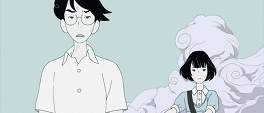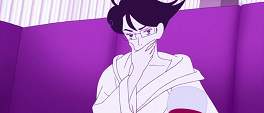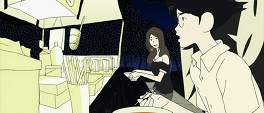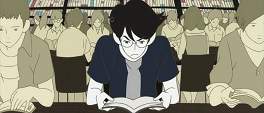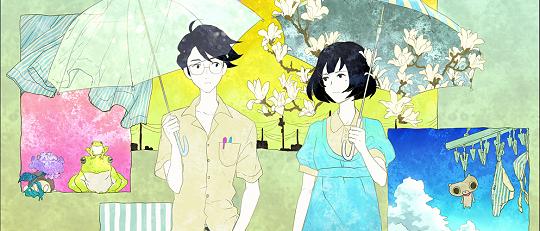Yojouhan Shinwa Taikei is a reminder of just how thrilling a series can be when it dares to be different. Underneath the speed talking protagonist and the eyeball LSD art-style is a current of enthusiasm that is positively infectious; it toys with narrative, characters, aesthetics and music in such a playful and endearing way that before long it doesn't matter if the series fits together all the pieces, the energy and cast are enough to carry it through. That it does tie together all the story threads in a way that is achingly brilliant is just another reason to fall completely and utterly in love. Unpretentious, endlessly enjoyable and supremely satisfying, this is a series whose execution and limitless creativity is only the tip of something sublime.
It doesn't seem to matter which university club the protagonist chooses, events never end up how he wants them to. Tennis, cycling, foreign languages, film - all conclude with him unhappy and burdened with the desire to turn back the clock to relive his two years and obtain his rose-coloured campus life. His misadventures are accompanied by a panoply of roguish characters: the devious and incomparably snide Ozu, the belligerent and mottephobic Akashi, the plunging chin of the easygoing Higuchi or the dentistry student Hanuki - prone to giving gum massages when inebriated. The protagonist is convinced his discontent stems from a wayward decision, the question is will he ever make the right choice in order to be happy?
At first it seems as if the series will follow the same scenario as Groundhog Day whereby the unnamed protagonist is forced to repeat his predicament until he somehow stumbles upon the correct cosmic alignment of circumstances to allow him to proceed. Thankfully the story here is far more subtle and feeds into the protagonist's mindset and although his eventual escape is triggered by a single event, it is the process leading up to that which is the most fascinating. The story is further individualised by resetting the protagonist as well, making him completely unaware of his repetition - not even a throwaway mention of deja vu. At first this seems like it may become infuriating, however as each episode spins off on wildly tangential lines - showing separate characters, situations and outcomes - the joy and intrigue from guessing where the series will travel next builds to immense proportions.
Although every scenario is interlinked, the true scale of their connection isn't wholly apparent without a subsequent viewing - so powerful is the ending's revelations it almost feels like a wholly different series. This isn't an undermining twist, just beautifully paced exposition - the pieces were all in play from the beginning, it just took eleven episodes before the rules were made clear. Certain episodes foreshadow this: obvious ones such as a bearded protagonist climbing through a window to meet his clean-shaven and utterly shocked doppelgänger, but more devious connections are littered everywhere and practically fall off characters such as Higuchi. The beauty is that these hooks need not be noticed for the series to be enjoyable - certainly it would be mildly baffling without them but the overall impression the series leaves is determinedly upbeat.
It's only once these individual strands are identified and teased out that the true measure of the series can be had. Simple things like the ending, a haunting and synthetic tune dubbed over abstract tatami floor plans, become indicative of the message the series peddles; even more so when it is switched for the opening, mirrored and reversed in the final episode. The feeling that there are precise clockwork mechanisms working beneath the surface of the show is widespread and the fun comes from piecing together what they are operating. Attention and care like this can only come from an inspired mind, and it is no surprise that the multi-talented Masaaki Yuasa is behind this, the stamps of Mindgame, Kemonozume and Kaiba all too clear.
Other production members are, similarly, stalwarts of those series but it is the art-punch aesthetics that really steal the spotlight. Angles dart about from low and oblique to long and lingering and rarely an episode goes by without some contorted transition of scenery melting or character twisting animation. There may never be much detail to the characters but their malleability more than makes up for this, combined with acutely cluttered backgrounds or even switching to stuttering live action and the result is visuals which feel like barely restrained chaos, waiting for an opportunity to leap off the screen.
If the visuals wow, it is the audio which reigns them in with unintrusive music from Michiru Oshima throughout and Asian Kung Fu Generation for the opening, the cast is similarly subdued. The protagonist, voiced by Shintaro Asanuma, does a brilliant job with the unique rapid fire dead pan, adding a solemn and likeable side to what could have easily turned into yet another Kyon from Haruhi. Ozu is similarly superbly voiced his words dripping with subversion. It is of course Maaya Sakamoto as Akashi who stands out the most though; a masterpiece of characterisation: with very few scenes featuring her and fewer still with any meaningful dialogue she remains an enigma, yet one that is supremely enticing regardless of her voice actor.
It is here that the series demonstrates that even with so little it can achieve so much. The protagonist may dip into extended diatribes on life, but the speed and ease of delivery means they're rarely dull; a maelstrom of consciousness with nuggets of truth and revelation buried within them. The series' hook may be rewinding time but its strengths are elsewhere. Best illustrated in the central three episode arc which has the suitably oblivious protagonist make a choice between three different females, of course all of them entirely unsuitable. It's here where the audience is introduced to the cowboy, the representation of the protagonist's libido, and yet another layer, this time allegorical, is added to the series' wiles. It is also at this point that Akashi's involvement with the protagonist's plight is made obvious and his utter obliviousness to this initially disconcerting.
There is so much to love with Yojouhan Shinwa Taikei that it's all to easy to slip into superlatives, incoherently rambling about the 4.5 tatami universe and its commentary on a life replete with choices. More importantly than all the different layers, the cyclic storytelling, the connection with string theory and many worlds, is that every episode without fail just puts a smile on one's face. Whether it is the self-knowing absurdity of looking after a love doll for a film maker obsessed with breasts, or a begrudging envy of the protagonist working non-stop to buy bicycle parts, the situations are so novel, the characters so elegant and the animation so beguiling it stops being just another series and ascends to a modern classic. Free of pomp and circumstance, it doesn't explode with audacity but burns hot right through to the end. Simply magnificent.



